A key to understanding how people make decisions is knowing that people are motivated by incentives. For example, Lawrence Kohlberg presents three level of incentives:
- Preconventional – “There is no morality.” People make decisions based on fear of punishment. People do not steal inventory for fear of getting arrested or fired.
- Conventional – “I did nothing wrong!” “Everyone else does it!” People act to conform their behavior to the expectations of the groups to which they belong. It is against the law to speed on the way to work, but everyone else does it.
- Postconventional – “I did the right thing” regardless of what people think or say. People understand the reasoning behind a moral principle. A CPA should turn down a lucrative client because he/she knows that the client may ask the CPA to do things that do not follow the CPA’s ethical code.
Employees work at their jobs because their employers pay them. This example is a positive incentive. A CFO of a public company may not inflate financials for fear of being jailed. This example is a negative incentive.
As CPAs, we must balance the incentive of maintaining the public trust and maintaining our clients’ interests, which may not be the same. A client may want to report investments at historical costs if the values have declined, but the public would like to know the fair value of what those investments are worth today. It is important for CPAs to act with a postconventional framework and do the right thing for the public, even if the client does not agree. For example, if a client asks the CPA to change the method of accounting, the CPA needs to examine the reasons behind the change. Although the change may be permitted under accounting guidance, it may purposely inflate or deflate a number that the client is trying to manage. In other words, a change maybe 100% legal, but only 10% ethical when examining the different stakeholders.
It is impossible for all CPAs to act with a postconventional framework. Therefore, the government has imposed rules upon our independence and objectivity, and the AICPA and state CPA societies have developed ethical committees to investigate unethical behavior by CPAs. These rules and watchdog activities will help curtail the behavior of those CPAs acting at the preconventional and conventional levels, but we challenge you to consider your own professional and personal situations with a postconventional view.
About the Authors:
 George is an instructor for the AuditSense team, specializing in providing ethics and core-level staff training. Since 1976, George has worked in many areas of accounting, focusing on Auditing and Accounting Education. In 1976, he participated in the Internal Auditor Intern Program at the Clark Equipment Company. While working for the public accounting firm of Deloitte, Haskins, and Sells, George served as a Senior Assistant Auditor and a Comprehensive Business Services Consultant.
George is an instructor for the AuditSense team, specializing in providing ethics and core-level staff training. Since 1976, George has worked in many areas of accounting, focusing on Auditing and Accounting Education. In 1976, he participated in the Internal Auditor Intern Program at the Clark Equipment Company. While working for the public accounting firm of Deloitte, Haskins, and Sells, George served as a Senior Assistant Auditor and a Comprehensive Business Services Consultant.
Read More
 Elizabeth Pittelkow is an Accounting Manager at ArrowStream, and she works in the areas of accounting, taxes, and financial reporting. Elizabeth previously worked in Finance at Motorola and in Assurance at PricewaterhouseCoopers. While at PricewaterhouseCoopers, she audited large public-accelerated GAAP filers, IFRS filers, private equity-owned companies, and non-profit businesses.
Elizabeth Pittelkow is an Accounting Manager at ArrowStream, and she works in the areas of accounting, taxes, and financial reporting. Elizabeth previously worked in Finance at Motorola and in Assurance at PricewaterhouseCoopers. While at PricewaterhouseCoopers, she audited large public-accelerated GAAP filers, IFRS filers, private equity-owned companies, and non-profit businesses.
Read More


